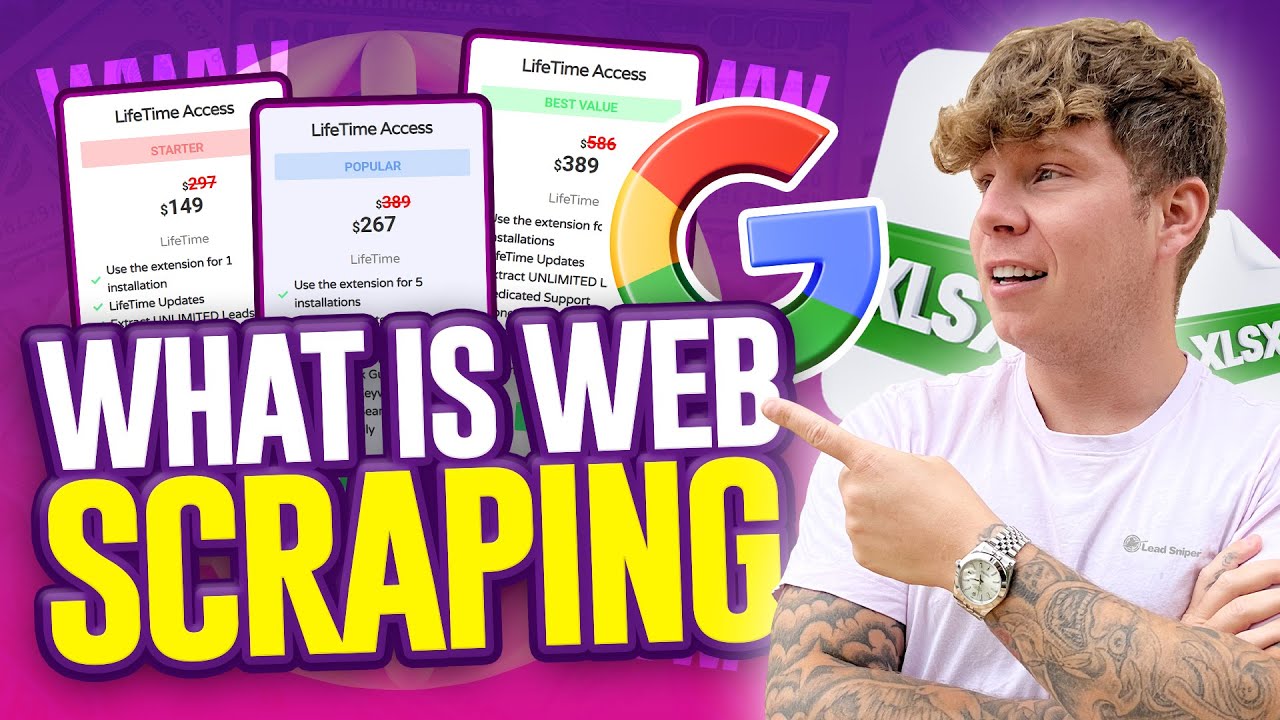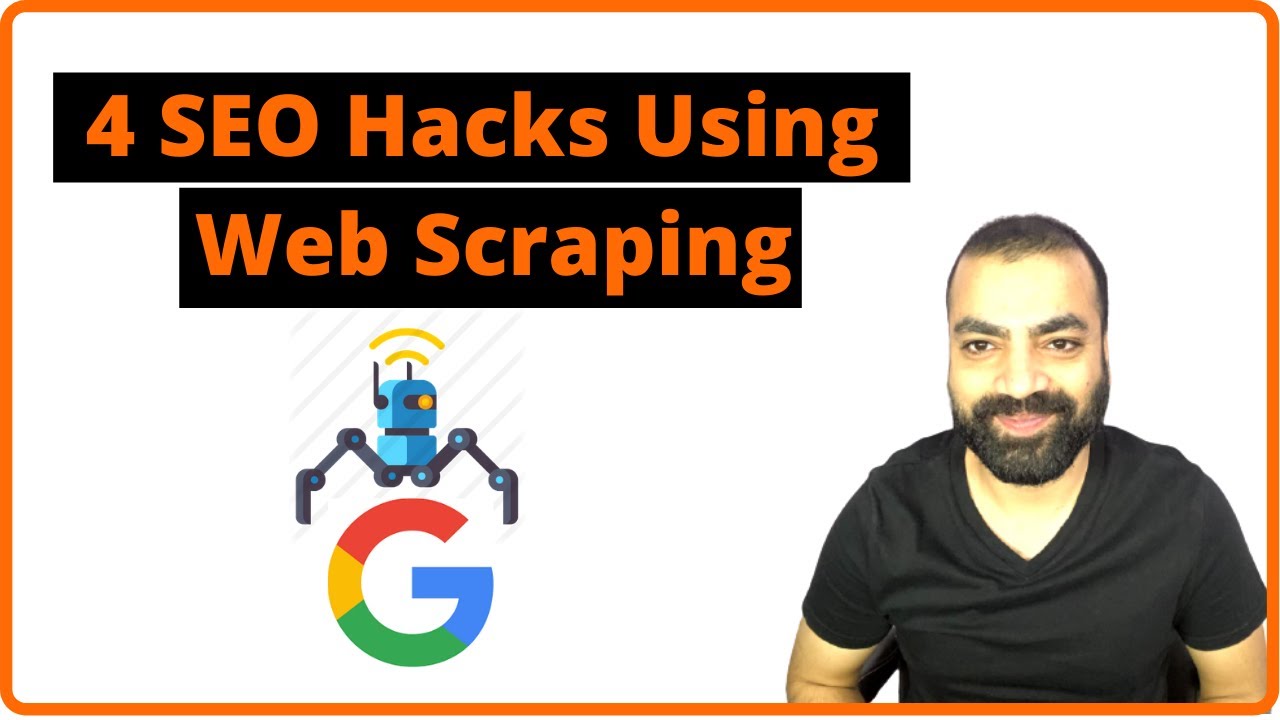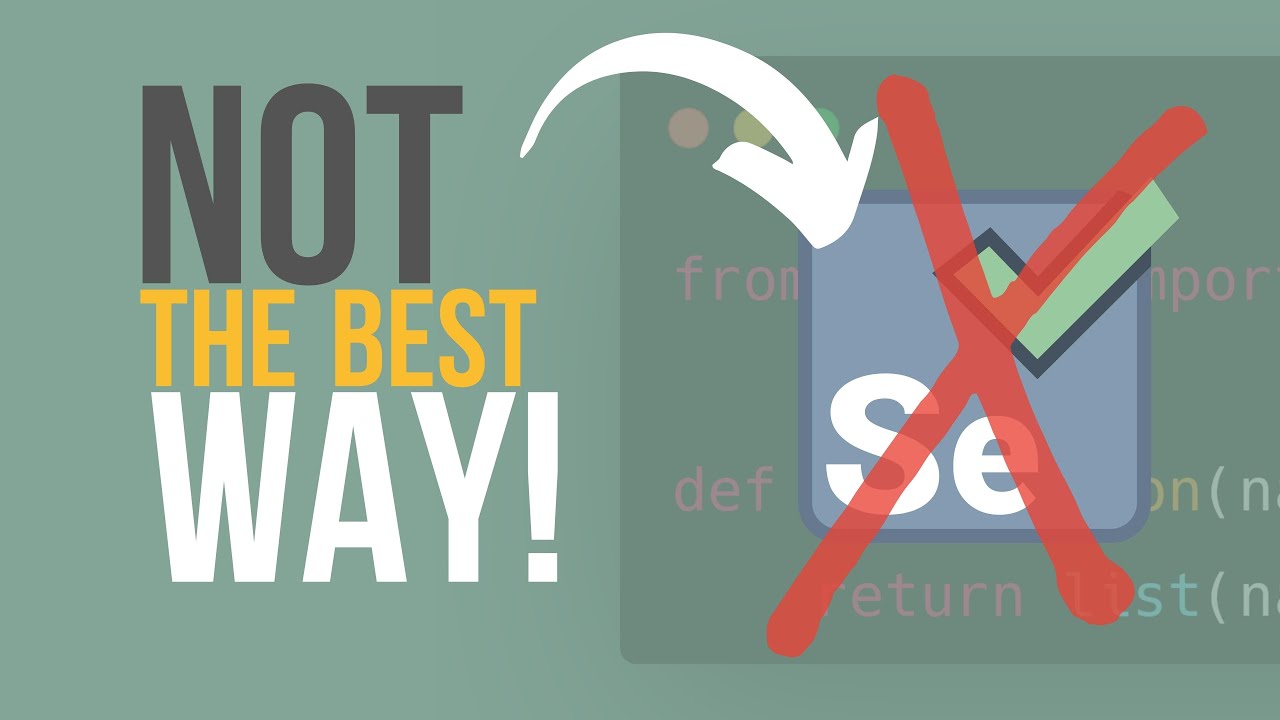In the ever-evolving landscape of search engine optimization(SEO), gaining a competitive edge is crucial. Web scrapingemerges as a valuable technique that can greatly enhance SEOstrategies. By extracting data from websites, web scraping provides SEOprofessionals with valuable insights, competitor analysis, and content optimizationopportunities. In this article, we will explore how web scraping can be utilized effectively for SEO purposes, revolutionizing the way websites are optimized for search engines.
What Is Web Scraping?

What Is Web Scraping 🔥 Are You Ready to Master Web Scraping on Google Search?
Web scraping is the process of automatically extracting data from websites. It involves using software or programming code to navigate web pages, retrieve specific information, and store it in a structured format for further analysis or use.
Web scraping allows you to gather data from various online sources, such as e-commerce sites, social mediaplatforms, news websites, and more. It enables you to extract data fields like text, images, URLs, prices, reviews, and any other relevant information present on the web page. Web scraping plays a vital role in data collection, market research, competitor analysis, contentaggregation, and many other applications across different industries.
Why Web Scraping Matters For SEO?
Web scraping holds significant importance for SEO (Search EngineOptimization) due to the following reasons:
- Competitor Analysis -Web scraping allows SEO professionals to gather data on competitors' websites, including their content, keywords, meta tags, backlinks, and overall SEO strategies. By analyzing this information, one can identify opportunities to improve their own website's SEO and outrank competitors in search engine results.
- Keyword Research -Web scraping can be used to extract data from search engine results pages (SERPs) and identify relevant keywords, search volumes, and keyword trends. This information helps in optimizing website content and targeting the right keywords to improve organic rankings.
- Content Aggregation and Curation -Web scraping enables SEO practitioners to aggregate data and content from various sources, such as industry blogs, news websites, or social media platforms. This allows them to curate relevant and high-quality content for their own websites, enhancing user experienceand providing valuable information to visitors.
- Backlink Analysis-Web scraping can be utilized to extract data on backlinks from different websites. By analyzing backlink profiles, SEO professionals can identify high-quality and authoritative websites for potential link-building opportunities, which can positively impact their website's search engine rankings.
- Monitoring and Tracking -Web scraping facilitates the monitoring and tracking of search engine rankings, website performance, and other SEO metrics. By automating the data extraction process, SEO professionals can regularly collect and analyze data, track changes, and make informed decisions to optimize their websites.
How Web Scraping For SEO Works?

How web scraping can be used to improve your SEO
Web scraping for SEO involves several steps to gather relevant data and utilize it to enhance search engine optimization efforts. Here's a simplified overview of how web scraping works for SEO:
- Identifying Target Websites -Determine the websites you want to scrape for SEO purposes. These can include competitor websites, industry blogs, SERPs, or any other sources that provide valuable data for analysis.
- Defining Data Requirements -Identify the specific data elements you want to extract through web scraping. This can include keywords, meta tags, backlinks, content, SERPfeatures, and more. Having clear objectives will guide the scraping process.
- Choosing Web Scraping Tools -Select suitable web scraping tools or libraries based on your programming skills and requirements. Popular options include Python-based libraries like Beautiful Soup, Scrapy, or Selenium.
- Writing Scraping Code -Use the chosen web scraping tool to write code that navigates through web pages, identifies the desired data elements based on HTML structure or CSS selectors, and extracts the information.
- Handling Dynamic Content -Some websites use dynamic content loading techniques like JavaScript or AJAX. In such cases, additional measures may be required to handle the dynamic content, including the use of headless browsers or interactions with APIs.
- Storing and Analyzing Scraped Data -Save the scraped data in a structured format such as CSV, JSON, or a database. Analyze the extracted data to gain insights into competitor strategies, keyword research, content optimization, or other SEO-related activities.
- Regular Updates and Monitoring -Depending on your SEO goals, you may need to schedule regular web scraping tasks to keep your data up to date. This ensures that you have the most recent information for analysis and monitoring.
It's important to note that when conducting web scraping for SEO, it's crucial to respect website terms of service, comply with legal regulations, and avoid overloading servers with excessive requests. Responsible and ethical web scraping practices are essential to maintain a positive online ecosystem.
9 Steps On Web Scraping To Boost Your SEO Results

4 SEO Hacks – How To Use Web Scraping For SEO
- Identify Your Objectives -Determine your specific SEO goals and the type of data you need to achieve them. This could include competitor analysis, keyword research, content optimization, backlink analysis, or monitoring search engine rankings.
- Select the Right Tools -Choose the appropriate web scraping tools and technologies based on your requirements. Popular options include Python libraries like Beautiful Soup, Scrapy, or Selenium. Alternatively, you can explore browser extensions or web scraping services that align with your needs.
- Identify Target Websites -Determine the websites you want to scrape for SEO purposes. This could include competitor websites, industry blogs, news websites, or search engine results pages (SERPs).
- Understand Website Structure -Inspect the HTML structure of the target websites using browser developer tools. Identify the specific elements and data you want to extract, such as headings, meta tags, URLs, or backlinks. Understanding the structure helps you write precise scraping code.
- Develop Scraping Code -Use your chosen web scraping tool or library to write code that navigates through web pages, locates the desired data elements, and extracts the information. Employ techniques like parsing HTML, using XPath or CSS selectors, or handling JavaScript-driven content.
- Handle Dynamic Content -If the target websites employ dynamic content loaded through JavaScript or AJAX, use appropriate techniques like headless browsers or waiting for page rendering to ensure accurate data extraction.
- Validate and Clean Data -Validate and clean the scraped data to ensure its accuracy and integrity. Remove any irrelevant or duplicated information and format the data in a structured manner for further analysis.
- Analyze and Apply Insights -Analyze the extracted data to gain insights and identify opportunities for optimization. Use the data for tasks such as competitor analysis, keyword research, content optimization, or backlink building. Apply the insights to enhance your SEO strategyand improve your website's performance.
- Regularly Update and Maintain -Web scraping is an ongoing process, as websites change over time. Regularly update your scraping code to adapt to any website changes and maintain the scraping infrastructure to ensure consistent and reliable data extraction.
By following these steps, you can effectively leverage web scraping to gather valuable data, gain insights, and enhance your SEO efforts. Remember to always adhere to legal and ethical guidelines, respect website policies, and maintain responsible web scraping practices.
Tools And Techniques For Web Scraping

Best Tools for Web Scraping: How to Easily Complete Your Scraping Projects
There are various tools and techniques available for web scraping, each with its own advantages and use cases. Here are some popular tools and techniques commonly used for web scraping:
- Python Libraries -Python is a widely used programming language for web scraping due to its versatility and rich ecosystem of libraries. Some popular Python libraries for web scraping include:
- Browser Extensions -Browser extensions provide a user-friendly approach to web scraping. These extensions can be installed directly in web browsers, offering convenient options for data extraction. Some popular browser extensions for web scraping include:
- APIs -Some websites provide APIs (Application Programming Interfaces) that allow access to their data in a structured and controlled manner. APIs provide a more reliable and authorized way to retrieve data compared to scraping web pages directly. Check if the target website offers an API for accessing the desired data.
- Headless Browsers -Headless browsers simulate the behavior of web browsers without the need for a graphical user interface. They can be controlled programmatically to scrape websites with dynamic content or JavaScript-driven elements. Popular headless browsers include:
- Web Scraping Services -If you prefer a more managed approach, there are web scraping services and platforms available that simplify the process. These services handle the infrastructure, scalability, and maintenance aspects of web scraping. Some popular web scraping services include:
It's important to note that while web scraping is a powerful technique, it's crucial to be mindful of legal and ethical considerations, respect website terms of service, and ensure compliance with applicable laws and regulations.
Legal And Ethical Considerations
When engaging in web scraping activities, it is essential to consider the legal and ethical aspects to ensure compliance and maintain responsible practices. Here are some key considerations:
- Respect Website Terms of Service -Review and understand the terms of service, terms of use, or any other guidelines provided by the websites you intend to scrape. Some websites explicitly prohibit web scraping or impose specific restrictions. Comply with these terms and respect the website's policies.
- Check for Robots.txt File -The robots.txt file is a standard used by websites to communicate instructions to web crawlers and scrapers. Make sure to check if the website has a robots.txt file and follow the directives outlined within it. Disregarding the robots.txt file can be considered unethical and may lead to legal consequences.
- Avoid Unauthorized Access -Do not attempt to access restricted areas of websites, require authentication, or engage in any activity that violates access control mechanisms. Limit your scraping activities to publicly available data and respect the website's security measures.
- Data Privacy and Personal Information -Be mindful of data privacy regulations and ethical considerations when scraping websites that may contain personal information. Avoid collecting or storing personally identifiable information (PII) without consent or in violation of applicable laws.
- Rate Limiting and Server Load -Respect the server load and bandwidth limitations of the websites you are scraping. Adhere to any rate-limiting policies specified by the website to avoid causing excessive strain on their servers or triggering blocking mechanisms.
- Attribution and Copyright -When using scraped data or content from websites, provide appropriate attribution and respect copyright laws. Ensure that you have the necessary permissions or adhere to fair use policies, depending on the jurisdiction and the nature of the content.
- Use Official APIs -Whenever possible, utilize official APIs (Application Programming Interfaces) provided by websites for accessing data. APIs are designed explicitly for data retrieval and typically have guidelines and usage limits in place, ensuring compliance with legal and ethical standards.
It is crucial to stay informed about legal regulations, data protection laws, and any updates or changes that may impact web scraping practices in your jurisdiction. Adhering to legal and ethical considerations ensures a responsible approach to web scraping and helps maintain a positive online ecosystem for all parties involved.
Mistakes To Avoid When Utilizing Web Scraping

The Biggest Mistake Beginners Make When Web Scraping
When utilizing web scraping for SEO, it's important to be aware of potential mistakes and pitfalls to avoid. By steering clear of these common errors, you can maximize the effectiveness and efficiency of your web scraping efforts. Here are some mistakes to watch out for:
- Violating Website Terms of Service -Failing to respect the terms of service or terms of use of the websites you scrape is a significant mistake. Make sure to review and comply with these terms, as scraping without permission or against the website's policies can lead to legal consequences and damage your reputation.
- Ignoring Legal and Ethical Considerations -Neglecting legal and ethical guidelines can have serious ramifications. Ensure that you comply with data protection laws, respect copyright and intellectual property rights, and adhere to fair use policies. Additionally, consider the privacy of personal information and follow proper data handling practices.
- Overloading Servers with Requests -Sending an excessive number of requests to a website can strain its servers and lead to server crashes or blocking mechanisms. Respect rate limits and implement proper throttling mechanisms to avoid overloading the target website's infrastructure.
- Not Adapting to Website Changes -Websites are dynamic and frequently undergo changes to their structure, HTML tags, or CSS selectors. Failing to adapt your scraping code to these changes can result in broken or incomplete data extraction. Regularly monitor the websites you scrape and update your code accordingly.
- Relying Solely on Web-Scraped Data -While web scraping can provide valuable insights, it should not be the sole basis for decision-making. Combine web-scraped data with other research methods and data sources to gain a comprehensive understanding of your SEO landscape.
- Not Respecting Robots.txt -The robots.txt file is used by websites to communicate instructions to web crawlers and scrapers. Disregarding the directives outlined in the robots.txt file is considered unethical and can damage your reputation. Always check for and adhere to the instructions provided in the file.
- Failing to Handle Dynamic Content -Many websites use dynamic content loaded through JavaScript or AJAX. If your scraping code doesn't handle dynamic content properly, you may miss out on valuable data. Utilize tools like headless browsers or techniques like waiting for page rendering to ensure complete data extraction.
- Inaccurate Data Extraction -Mistakes in your scraping code can lead to inaccurate or incomplete data extraction. Double-check your code to ensure that you are correctly targeting and extracting the desired data fields. Validate and clean the extracted data to maintain data quality and integrity.
- Lack of Monitoring and Maintenance -Web scraping is an ongoing process, and websites may change their structure, policies, or APIs over time. Regularly monitor the websites you scrape, update your code as needed, and maintain the scraping infrastructure to ensure consistent and reliable data extraction.
People Also Ask
Is Web Scraping Legal?
Web scraping legality varies depending on factors such as website terms of service, copyright restrictions, and data privacy laws. It's essential to ensure compliance with legal guidelines and respect website policies.
Can Web Scraping Be Automated For SEO Tasks?
Web scraping can be automated using scripts or specialized tools. This allows SEO practitioners to regularly extract and analyze data, monitor rankings, and stay updated on competitors, saving time and improving efficiency.
Are There Any Challenges Or Limitations To Consider With Web Scraping For SEO?
Web scraping may encounter challenges such as website security measures, rate limiting, handling dynamic content, and data accuracy. SEO professionals should be mindful of these limitations and adapt their strategies accordingly.
Conclusion
Web scraping has become an indispensable tool for SEO practitioners looking to gain a competitive advantage in the digital landscape. Through this proactive approach, websites can achieve improved search engine visibility, higher organic rankings, and increased organic traffic.
As web scraping continues to evolve, it will remain a powerful ally for SEO experts, enabling them to stay ahead of the competition and unlock the full potential of their websites in the search engine ecosystem. Embracing web scraping for SEO is a strategic move that can propel businesses toward online success in the ever-expanding digital world.
